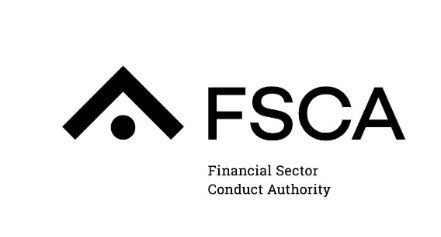There are a growing plethora of FSCA regulated brokers that are emerging, but who are the best, and what does FSCA regulation mean for you as a consumer?
The Financial Sector Conduct Authority (FSCA) was established in April 2018, following the dissolution of the two previous regulatory bodies: the Financial Services Board and the Consumer Protection division of the National Treasury. The FSCA is responsible for regulating conduct within South Africa’s financial sector, including insurance companies, banks, pension funds, and financial advisors.
The FSCA’s role has continued to evolve as it works towards its goal of protecting consumers and promoting soundness in the financial sector. It is also responsible for registering and supervising all non-banking financial institutions, including collective investment schemes and retirement funds.
Trading instruments regulated by the FSCA:
– Stocks and bonds
– Derivatives (including CFDs)
– Collective investment schemes
– Retirement funds
– Short term insurance products.
Prior to its establishment, South Africa’s financial regulation had been divided between multiple entities with overlapping responsibilities. This led to a lack of effective oversight and potential conflicts of interest. The FSCA was created as part of a major restructuring effort to address these issues and improve consumer protection in the financial sector.
As the successor to both the Financial Services Board and Consumer Protection division, the FSCA inherited a number of ongoing investigations and cases. These have included high-profile actions against companies such as Steinhoff International and African Bank, as well as actions to address insider trading and market manipulation.
The FSCA’s responsibilities also include educating consumers about their rights and promoting financial literacy. Through initiatives such as the National Financial Literacy Strategy, the authority aims to empower South African consumers to make informed financial decisions.
Since its establishment, the FSCA has faced criticism for being under-resourced and slow to respond to issues in the financial sector. However, it remains committed to improving conduct within the industry and protecting consumer interests.
How & Who To Reach at the FSCA

Key Personnel:
– Dube Tshidi, Chief Executive Officer
– Paul Kekana, Chief Financial Officer
– Farzana Badat and Katherine Gibson, Deputy Commissioners
FSCA Contact Details
Address –
1st Floor, Block A, The Towers,
2nd Crescent Corner Cradock Avenue and Biermann Avenue,
Rosebank,
Johannesburg, 2196.
Telephone number: +27(0)87 940 9000.
Website: http://www.fsca.co.za/Pages/default.aspx
Important links for consumers:
– Complaints and Dispute Resolution process: http://www.fsca.co.za/Consumer/Pages/Complaints-Dispute-Resolution.aspx
– How to spot a scam: http://www.fsca.co.za/Consumer/Pages/Scams-Prevention.aspx
– List of authorized financial services providers: http://www.fsca.co.za/Supervision/AuthorisedFSPs/Pages/default.aspx
Rules for FSCA regulated brokers – Derivatives
There are various rules and guidelines that FSCA regulated brokers must follow and abide by. There are different ways to choose the best brokers to trade with personally, but you definitely want to make sure that they are rule abiding. FSCA regulated brokers ensure that the following rules are known:
– Derivatives brokers must be registered with the FSCA and hold a license to provide derivative services in South Africa
– These brokers must adhere to all regulatory guidelines set by the FSCA, including maintaining proper record keeping and reporting any suspicious activity
– They must also conduct their business in a fair, honest, and transparent manner, putting the interests of their clients first
– The FSCA also has the authority to investigate and take disciplinary action against any derivatives broker found to be violating these rules and regulations.
– In addition, the FSCA works closely with other authorities such as the JSE Limited (in charge of the Johannesburg stock exchange) to ensure proper oversight of derivatives trading in South Africa.
-minimum capital requirements, margin requirements, and client money protection measures are also in place to ensure the safety of investors and the stability of the market.
FSCA FAQs
How does the FSCA make money?
The FSCA obtains its funding primarily through levies, fees and fines paid by financial services providers. These funds are used to cover the costs of regulatory operations, such as overseeing compliance with regulations, conducting investigations and enforcing penalties. The FSCA also receives funding from the National Treasury.
In addition to these sources of revenue, the FSCA also generates income through investments in financial markets. These funds are held in the FSCA Reserve Fund and can only be used for specified regulatory activities.
Overall, the FSCA is committed to responsible and transparent management of its resources in order to effectively carry out its mandate to protect consumers and promote fair competition in the financial services sector.
Who regulates the FSCA regulator?
The FSCA is accountable to the Minister of Finance and Parliament, as well as the Financial Sector Conduct Authority Tribunal, which adjudicates on appeals relating to regulatory decisions made by the FSCA. The FSCA is also subject to external audit by the Auditor General. Additionally, the FSCA collaborates with other regulatory authorities in the financial sector, such as the South African Reserve Bank and the Prudential Authority.
What consumer complaints does the FSCA handle?
The FSCA handles consumer complaints related to financial services providers, including banks, insurance companies, retirement funds, and investment firms. This includes complaints about unfair treatment or poor service, as well as financial misconduct such as fraud. Consumers can submit complaints to the FSCA through their website, email, or by post. The FSCA will then investigate and take necessary action, which may include imposing disciplinary measures or seeking compensation for the affected consumer.
Consumers can also file complaints with the Ombudsman for Banking Services, which operates independently from the FSCA but has a similar mandate to resolve disputes and protect consumer rights.












